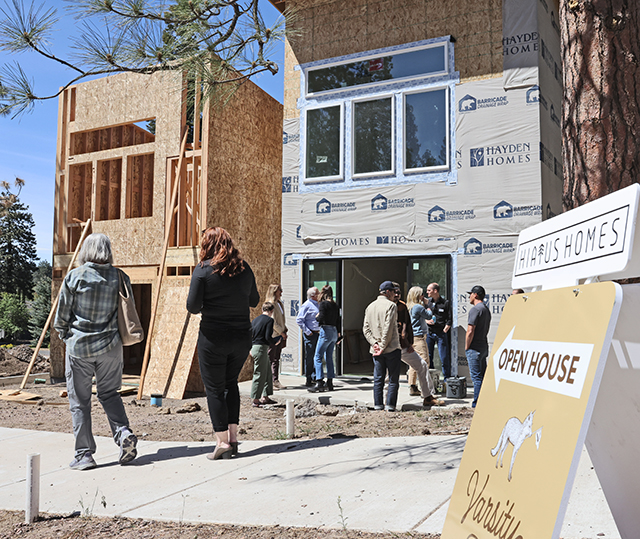Owners of maligned dog breed unite at free clinic
Published 12:00 am Friday, August 14, 2015

- Denys Bucksten / Chicago Tribune / TNS Veterinarian Jack MacKenzie meets a young patient waiting in line at a free pit bull health clinic hosted by the Bryan & Amanda Bickell Foundation in Waukegan, Illinois.
WAUKEGAN, Ill. — More than 200 pet owners gathered on a recent Saturday, many well before the 11 a.m. start, for a pit bull health clinic at Waukegan Animal Control, free to city residents. People and pets stood beneath a blazing sun in high humidity with the patience and enthusiasm of fans lining up for Chicago Blackhawks playoff tickets.
The clinic, sponsored by Bryan & Amanda Bickell Foundation, uses the hockey star’s fame and resources to help pit bulls, widely regarded as the most abused and discarded domestic pet in the U.S.
The clinic administered vaccines; implanted microchips in the dogs; and gave out high-quality leashes, collars, harnesses, food, chew toys and training information. Clinic workers also set up 138 appointments for free spaying or neutering at area veterinary clinics.
Waukegan Animal Control Director Susan Elliot said the clinic was a success, but she and Bickell Foundation director Alicia Boemi agreed that Waukegan will need a follow-up clinic in late August or early September, starting earlier in the day to avoid a repeat of the weather stress.
“People were standing out in front of our gate at 8:30,” said Elliot. “What was most shocking to me was that there was not one human-aggressive dog. I was in awe how well behaved the pit bulls were in a situation where it was hot and a million other dogs around them.”
“Any dog we felt was getting too hot, we stuck them in an air-conditioned vehicle, and we kept watering down the dogs,” Elliot added.
Elliot was especially pleased with the high number of owners signed up to get their dogs fixed, to prevent unwanted puppies from a dog breed facing public perception as being vicious, dangerous animals.
Dog owner Douglas Nordlane and his two female pit bulls at one point moved into the air-conditioned animal control office. Nordlane seemed typical of many attendees, with his beautiful, happy and well-groomed dogs, but not enough resources for spaying, shots and other costly upkeep.
“I have two daughters in (college),” said Nordlane, explaining why the free services meant so much. Nordlane hadn’t planned on adopting pit bulls, he said, but took action to save one being abandoned not too long ago, leading to his affection for the breed.
Volunteers from Chicago Veterinary Emergency & Specialty Center, Players for Pits, 3R Dog Training, Fetching Tails, Two Bostons, Bait Free, and Wet Nose verified that owners were Waukegan residents, provided services, rushed bowls and bottles of water to the lines of waiting people and pets, moved at-risk attendees into air-conditioned vehicles or the animal control building and kept the lines moving.
The clinic was the latest evidence of a Waukegan coalition — Mayor Wayne Motley, city officials, Elliot’s animal control staff and assorted humane nonprofits — to set a standard for care of animals in the city.
“I give all the credit for the success of this program to Susan Elliot, who coordinated this event with the Brian Bickell Foundation,” said Motley. “There’s no question we’re now really getting on the owners of animals, not just pit bulls, to register their animals, vaccinate them, maintain their animals, take them off chains and keep their pets in a good environment.
“We don’t want animals chained in the yard. I think it’s cruel, regardless of the weather,” he said.
Motley, a veteran Waukegan police officer who retired as sergeant, has long held that Waukegan’s animal control should be a no-kill facility, a de facto policy he achieved with the help of Elliot, Police Chief Wayne Walles and supporting nonprofits, such as WAGS, Waukegan Animals Getting Saved.
Veterinarian Dr. Jack MacKenzie, owner of Chicago Veterinary Emergency and Specialty Center, manned the front lines at the clinic, along with three of his clinic’s techs, who drove up from Chicago to volunteer their time.
“I was very impressed today with the shape these (Waukegan pit bulls) were in,” he said. “I looked at least half of these dogs and not a single one was in bad shape at all. They all looked very healthy. It was obvious these dogs are family and (their owners) take care of them.”
Retired Waukegan police officer Todd Schmitz, a dog owner who supports area shelters and specializes in saving injured reptiles in the wild, has seen his share of mistreated pit bulls and other animals.
Schmitz said pit bulls have gotten a bad rap because of their association with gangbangers, and others who’ve bought their dogs, sometimes for the wrong reasons. “Some of (the bangers) love their dogs; others simply got them for status. One problem is that the majority of bangers are young and immature. They can barely take care of themselves, let alone a dog.”






